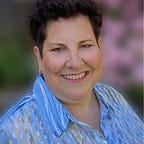What drives leading social justice advocate Deepa Iyer? “Outrage, a very healthy sense of outrage…”
My #WomentoFollow profile (15th ed)
By Rose Horowitz December 21, 2019
What drives leading social justice advocate Deepa Iyer? “Outrage, a very healthy sense of outrage…I have a nine-year-old son. It’s like a visual reminder of what and why this work is important,” says Deepa Iyer, attorney and noted author. My #WomentoFollowprofile (15th edition).
Iyer’s childhood experience of moving from India to Kentucky when she was 12 deeply influenced her life’s work, she says. “It really changed me and formed, I think, a lot of who I am today.” In the 1980’s, “people looked at color through our binary of black or white.”
People didn’t know where to place “folks like me,” says Iyer, who is from Kerala. Like other immigrants, she “endured a lot of teasing and isolation and bullying and really felt alone.” Being treated as an outsider left her with a “visceral feeling of this isn’t right.”
Growing up, Iyer wanted to become a journalist because she loved storytelling and the opportunity to persuade. “I think that’s also why I became a lawyer. You have to change people’s views, and laws and systems as well.” Iyer graduated from Notre Dame Law School and Vanderbilt University.
Iyer hosts the podcast “Solidarity Is This,” which explores people working on cross-racial projects. In training sessions, Iyer works with Muslim, Arab, and Asian-American organizations on profiling, hate violence, and #immigration. Here’s a link to recent podcast:
She served for a decade as executive director of South Asian Americans Leading Together (SAALT), focusing on community building in post-9/11 America. How to measure the impact of her social justice work? “It’s a very long arc of justice.”
“Any time you’re working on social change issues, you recognize that you might not see the effects in your lifetime. You see how things have shifted, say from the 1940’s to the 60’s to today,” says Iyer, who teaches in the Asian American studies program at the @UofMaryland.
Example: “In the immigrant movement, even like 20 years ago, people were okay with using words like illegal. But over time, we’ve seen how there has been a narrative & attitudinal shift…we say undocumented or people without papers,” Iyer says.
Another way to measure impact? “Young people are getting extremely mobilized & engaged on issues that affect their lives. So, whether it’s dreamers, teachers who are teaching dreamers, a lot of these concentric circles are growing…that’s how we speak to power and demand change.”
Iyer won an American Book Award for “We Too Sing America,” published by The New Press (2015). In a review, the Washington Post says Iyer is an “ideal chronicler” of the “experience of South Asian, Arab, Muslim and Sikh immigrant communities in post 9/11 America.”
She is passionate about building “solidarity in a transformative way.” A transactional way to show support for #BlackLivesMatter is to attend a rally, she says. “A transformative way is to intervene or disrupt conversations in your own community.” How?
A link to her blog:
If you’re at your dining room table & someone makes a racist comment, “you engage the person in a conversation about why that’s problematic,” Iyer says. “Take the risk.” Deepa Iyer, with 12,000K followers, is active on Twitter and other platforms. 12/
The significance of #WomentoFollow? “I think a hashtag like that re-centers people whose voices don’t usually get heard — women, women of color…it’s really important that we continue to have vehicles like that…it connects audiences to people that they may not have known about…”
Iyer’s three #WomentoFollow?
Tuhina Verma Rasche, a South Asian pastor who “blends spirituality and activism in a way that is really important.”
Margari Aziza, who is executive director of the Muslim Anti-Racism Collaborative. “She does really good work. And she also has really sharp and funny tweets.”
DarakshanRaja, co-founder of Justice for Muslims Collective, as another #WomentoFollow.
Other mentors: Jayne Park, head of IMPACT Silver Spring and Soya Jung with Change Lab in Seattle.
“We have to stand up for each other…we cannot afford to silo ourselves,” Iyer says. The future ? “I’m definitely going to be part of movements for social change. I know I’m not going to stop.
“I know that I am going to continue to offer my skills in supporting organizations and activists… I also know that I’ll be writing, teaching and training, and speaking out.”
Comments? I am always looking for tips and stories of smart #WomentoFollow.
Name 3 #WomentoFollow and amplify women’s voices on #socialmedia.
Here’s the #WomentoFollow Twitter list curated by Stacey Kratz. Subscribe!
